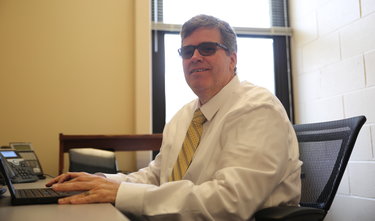From war to the ‘Wild West,’ Howell brings a range of experience to direct tech at GCSD
GUILDERLAND — David Howell is a constant learner — whether on the periscope to take pictures of the first Tomahawk missile fired from a submarine during war or organizing a computer system for the Rensselaer schools.
“My whole life has been learning new skills and teaching those skills,” Howell told The Enterprise this week.
The Guilderland School Board, in a unanimous vote on March 15, appointed Howell as Chief Information Officer and Director of Information Technology for the district. He starts the newly created job on April 11.
Howell has an unusual and distinctive résumé for a school administrator.
Born in Florida and raised in Alabama, the son of a career Navy man, Howell liked his vo-tech education. He joined the Navy at 17 as an electronics technician and spent 20 years in military service.
He became a computer and local area network administrator and was stationed in Groton, Connecticut and San Diego or on four different submarines. Howell was deployed seven times, mostly to the Middle East.
“I was in a submarine during Desert Storm in the northern Red Sea, firing Tomahawk missiles. We were the first submarine to ever do it in the time of war,” said Howell. “And then I was in the exact same spot in a different submarine several years later during Operation Iraqi Freedom.”
As leader of the photo team on the USS Louisville, Howell was on the periscope, taking pictures as that first missile was being fired. (Later, the Louisville Slugger company made a commemorative baseball bat for the crew on its return.)
“The Tomahawk is coming out of the water and you can see the nose cone and you can kind of see it almost out of the water and the wings, flipping out, and then like a contrail as it goes away,” said Howell, describing the experience in the present tense as if it were unfolding before his eyes.
Howell also described feeling “definitely detached.”
“You’re not face to face,” he said, with the enemy. “You’re not even firing long-range, anti-tank, or anything like that. You’re not in the sand. You’re in the water, not seeing your enemy … You never really, really know what happened.”
Life on a Navy submarine, Howell said, is either “very exciting or very boring.” He explained, “You’re always learning new skills and then you’re teaching them … You’re always qualifying the next watch station or the next, you know? … So there’s a lot of studying, a lot of hands-on qualifications.”
In his downtime, Howell said, he read a lot of books and watched a lot of movies.
When he retired from the Navy at age 37, Howell worked at Knolls Atomic Power Lab on supercomputers and storage arrays. He was there for three years with a company called the Information Management Group when he saw an ad that Rensselaer was building a new school and needed a network and systems engineer.
He applied for and got the job.
“I called it the Wild West,” said Howell. “Everybody had computers but there was no control, no centralized way of doing things … I kind of brought that together,” he said.
Howell continued to learn and grow on the job. “I even was an adult learner. I went into the Navy at 17. I didn’t have a college degree,” said Howell, noting he’d “taken a ton of technical courses and a lot of college courses through the Navy.”
But he wanted a college degree. He and his wife, Renée Howell, went to the Massachusetts College of Libral Arts and graduated together on the same day in December 2019.
She has two children, Nicholas Conner and Casey Dwyer, and together they have two children: Jordan Howell, who is studying political science at New Paltz, and Donovan Howell, who is a student at Tech Valley High School.
“I’ve got four great kids and a lovely wife, and I’m so excited to get started on the 11th,” said Howell.
“There’s always new skills, especially in technology, that you have got to learn and stay abreast of,” he said.
Howell started at Rensselaer in 2008 and for many years longed for “a bigger district and a bigger opportunity with a bigger team.” The Rensselaer City School District has about 1,000 students while Guilderland has close to 5,000. Rensselaer has an information technology team of three, including Howell, while Guilderland has nine.
At Guilderland
Guilderland created the new post that Howell will be the first to fill following the death last October of Demian Singleton. Singleton had the title of assistant superintendent for curriculum and instruction but also served a second role as the district’s technology director.
This month, Superintendent Marie Wiles, in presenting a $110 million draft budget for next year, said that technology affects “every aspect of our school district operations,” naming not just academics but bus runs, attendance, lunch payments, and grades.
Since the pandemic, technology has become “much more integrated into our mission,” said Wiles. “We need a person who’s really good at forecasting what is coming …. The world of technology is very complicated … It really does require leadership.”
The position was posted with a salary of $115,000 to $135,000, depending on experience. Howell will be paid $120,000 annually for the year-round job.
Wiles told The Enterprise that the district received 30 applicants for the post.
“You hear so much about the workforce being depleted,” she said. “This position is very critical and really specialized. We were delighted to have a deep pool. David rose to the top … He has a wealth of pure technology expertise.”
For 14 years, he’s been the director of technology at a small school where he had to do all the jobs, Wiles said, adding that, with his military background, Howell has good leadership skills.
He also has good “translation skills,” Wiles said, which is useful when communicating with staff and students who “don’t live in the lingo of technology.”
Job candidates were given a complicated task, Wiles said, and “he had a thoughtful plan …. He did his homework very thoroughly. He knows a lot about what we’re all about.”
Howell told The Enterprise that the task he was given was to design a BYOD — bring your own device — network for the district so that students and staff could safely use their own phones, laptops, and other devices.
“I knew quite a bit about what it would take to do that successfully,” Howell said.
Last spring, the Guilderland schools suffered a cyber attack, which canceled in-person classes for several days, and was investigated by the FBI. At that point, the district had shut down the BYOD network it had.
Howell said he made a comment during the interview process that “that incident actually drove some adoption of security measures at all the districts around the Capital Region — so it had a ripple effect.”
He told The Enterprise this week, “At the same time, the state had had these new laws that were on the books for quite a while but weren’t ready to be implemented.”
Howell said that his initial approach at Guilderland will be to take a wait-and-see stance “because there’s a lot of information for me to gather to see if we’re following best practices.”
He went on, “That’s really going to be my focus at first: How does Guilderland do business? Are we following best practices? Are we running in a safe and secure manner?”
He concluded, “Customer service and best practices are my keywords; those are my buzzwords — to make sure that we are doing things so that the teachers and the staff and the students all feel supported and we’re giving them the tools they need, but doing it in a safe manner.”


